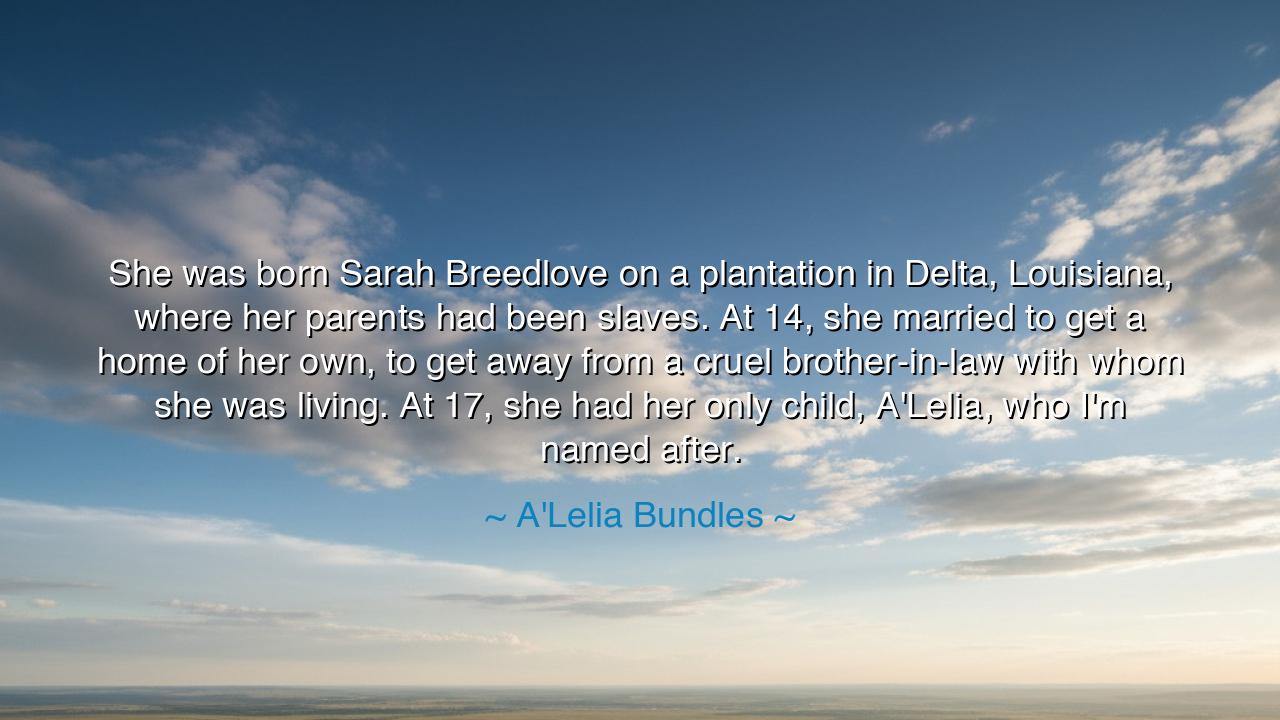
She was born Sarah Breedlove on a plantation in Delta, Louisiana
She was born Sarah Breedlove on a plantation in Delta, Louisiana, where her parents had been slaves. At 14, she married to get a home of her own, to get away from a cruel brother-in-law with whom she was living. At 17, she had her only child, A'Lelia, who I'm named after.






In the hush of remembered fields and the murmur of river reeds, the chronicler A’Lelia Bundles lifts a torch to her lineage: “She was born Sarah Breedlove on a plantation in Delta, Louisiana, where her parents had been slaves. At 14, she married to get a home of her own, to get away from a cruel brother-in-law with whom she was living. At 17, she had her only child, A’Lelia, who I’m named after.” Hear how the sentence walks from bondage to belonging, from danger to doorway, from namelessness to name. It is not merely biography; it is a genealogy of courage, spoken as one might pour libation for the elders—slowly, reverently, with both hands.
We pause upon the first stone: Sarah Breedlove. Born where freedom was a rumor that wandered the fence lines, she learned early the arithmetic of survival. The land taught hardness. Yet within the hardness, a spark: the certainty that even a life begun in the shadow of a whip can still bend toward the sun. The quote names the soil—Delta, Louisiana—so that the fruit will not be mistaken for chance. Roots matter; they carry iron and memory alike.
The second stone is the terrible calculus of safety. At 14, she married not for romance but for refuge, to claim a home against the storm of a cruel brother-in-law. Some hear scandal; the wise hear strategy. In ages past, the ancients told of pilgrims who traded sleep for watchfulness, silver for passage, youth for shelter. So it was here: a child stepping into adulthood because the house she had was not a house at all, and the door she chose, however imperfect, opened away from harm. This is the old truth: sometimes deliverance arrives in rough garments.
The third stone is inheritance. At 17, she bore her only child, A’Lelia—and with that birth the line of names began to braid itself into history. “Who I’m named after,” says the descendant, sealing past to present with a syllable. In the ancient world, to bear a name was to carry a task; to repeat a name was to keep a flame. The quote is a litany of identity: the mother who survived, the daughter who rose, the heir who speaks. Through naming, the story learns to walk from century to century without losing its breath.
Let a real-life tale unfold as witness. Years after those first hard choices, Sarah would be known to the world as Madam C. J. Walker, fashioning a business from kitchens and church basements, from demonstrations and doorways, from the firm handshake and the spoken promise kept. She turned wages into workshops, and workshops into wages for others. In towns where the ledger of opportunity ran thin, she wrote new columns—training women, funding schools, holding up civic work like a lantern at night. Do not be fooled by the later brightness: that light was flint-struck against earlier stone. The seed named in the quote—the child, the chosen name, the first sanctuary—grew into a canopy that shaded many.
The teaching here is double and sharp. First: beginnings do not decree endings. A cradle set within oppression can still rock toward liberty. Second: the will to live rightly is sometimes a patchwork—choices stitched from the cloth at hand. To marry for a home at 14 is not an ode to early vows; it is a lament that safety must be sought so young, and a salute to the audacity that sought it anyway. From such threads, greatness is woven—not spotless, but strong.
What then shall we pass to the next generation? Remember the place, respect the pain, and honor the pivot. Build homes—literal and figurative—where no one must bargain away childhood to be safe. Educate the hands as well as the heart; let skill become a shield. Name your children with purpose; teach them whose shoulders they stand upon so they do not mistake their height for solitary genius. When fortune comes, let it widen the table, not just thicken the walls.
And practice these rites of remembrance and repair: (1) Keep a family ledger—names, places, sacrifices—so your house knows its own story. (2) Make at least one room a sanctuary for study or work; consecrate the ordinary as a workshop of change. (3) Mentor someone younger; be the shelter you once needed or wish had existed. (4) Give your resources a mission—tithe to schools, clinics, apprenticeships—so prosperity becomes a river, not a pond. (5) Speak the names of your elders aloud; let gratitude be the drumbeat under your days. For from Sarah Breedlove to A’Lelia to the voice that says “I’m named after,” the lesson is clear: when courage builds a home, history finds a hearth; and from that hearth, new fire travels into the dark, carrying warmth for those who come after.






AAdministratorAdministrator
Welcome, honored guests. Please leave a comment, we will respond soon